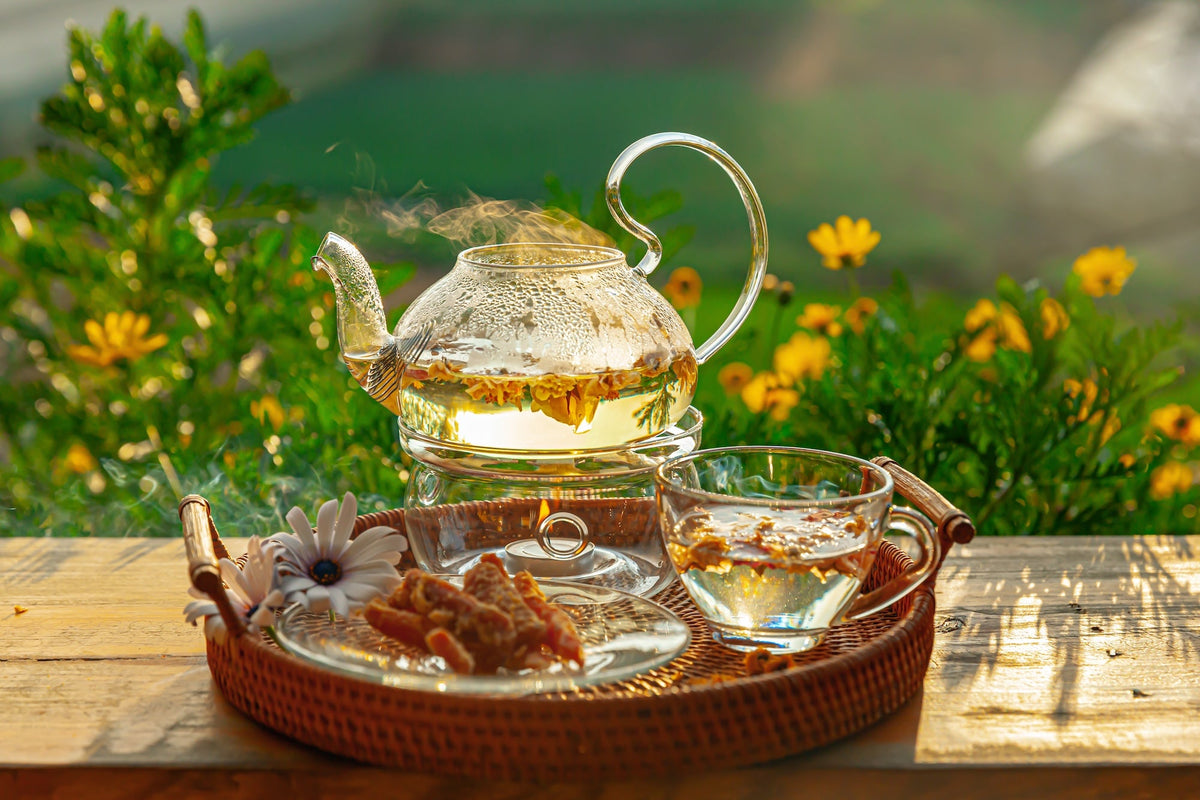
Does Chrysanthemum Tea Have Caffeine? A Complete Guide
|
|
Time to read 4 min
|
|
Time to read 4 min
Chrysanthemum tea is a popular herbal infusion known for its floral aroma and potential health benefits. However, one of the most common questions people ask is: does chrysanthemum tea have caffeine? Since many tea drinkers seek caffeine-free alternatives, it’s important to clarify whether chrysanthemum tea contains caffeine and how it compares to other types of tea.
In this article, we’ll explore the caffeine content in chrysanthemum tea, its health benefits, and the best ways to enjoy this floral infusion.
“Chrysanthemum tea is nature’s way of saying relaxation doesn’t need caffeine.”
To answer this question directly: No, chrysanthemum tea does not have caffeine. Unlike traditional teas made from the Camellia sinensis plant (such as black tea, green tea, and oolong tea), chrysanthemum tea is an herbal tea made from dried chrysanthemum flowers. Since it does not come from the tea plant, it naturally contains zero caffeine .
This makes chrysanthemum tea a great option for those looking to reduce their caffeine intake while still enjoying a soothing and flavorful drink.
Chrysanthemum tea is completely caffeine-free, making it different from traditional teas. For comparison, black tea typically contains between 40 to 70 milligrams of caffeine per 8-ounce cup, depending on the type and brewing time. Green tea has slightly lower caffeine content, averaging between 20 to 50 milligrams per cup, while oolong tea falls in the middle, usually containing around 30 to 55 milligrams per cup. White tea has the lowest caffeine content among traditional teas, with a range of 15 to 30 milligrams per cup.
Herbal teas, including chrysanthemum tea, differ from traditional teas because they are made from flowers, roots, leaves, or seeds of various plants rather than the tea plant. This means they remain naturally caffeine-free and can be consumed without the stimulating effects that come from regular tea or coffee. Other herbal teas that do not contain caffeine include peppermint tea, chamomile tea, and rooibos tea.
For those looking for an energy boost without caffeine, certain herbal teas such as ginseng tea or ginger tea may provide invigorating effects due to their warming and circulation-enhancing properties. However, chrysanthemum tea is better known for its calming and cooling effects, making it ideal for relaxation rather than stimulation.
The reason chrysanthemum tea does not contain caffeine lies in its origin. Caffeine is naturally found in the leaves of the Camellia sinensis plant, which is used to produce black, green, white, and oolong teas.
Chrysanthemum tea, however, is made from the dried flowers of the chrysanthemum plant, which does not produce caffeine.
Since it is purely floral and not derived from tea leaves, chrysanthemum tea is 100% caffeine-free and can be enjoyed at any time of the day without affecting sleep or causing caffeine-related side effects.
Now that we’ve established that chrysanthemum tea caffeine content is zero, let’s explore the benefits of drinking this herbal tea:
Since chrysanthemum tea contains no caffeine, it is often used as a calming beverage. It is known in traditional Chinese medicine for its cooling properties and is frequently consumed to reduce stress and anxiety.
Unlike caffeinated beverages, chrysanthemum tea can be consumed in the evening without disturbing your sleep. If you’re looking for a natural bedtime drink, chrysanthemum tea is a great caffeine-free option.
Chrysanthemum tea is packed with antioxidants, including flavonoids and vitamin C. These compounds help combat oxidative stress and support overall health.
Drinking chrysanthemum tea is believed to help relieve eye strain, especially for those who spend long hours in front of screens. This is why it is a popular drink among students and office workers.
Thanks to its natural anti-inflammatory and antibacterial properties, chrysanthemum tea is often used as a home remedy to boost immunity and fight off colds.
Chrysanthemum tea is traditionally used to help support digestion. Its anti-inflammatory properties may help soothe an upset stomach, making it a useful beverage after meals.
In Chinese medicine, chrysanthemum tea is known for its cooling effects. It is often used to help reduce internal heat, making it a popular choice for those experiencing fevers or hot weather.
While pure chrysanthemum tea does not contain caffeine, some tea blends may include chrysanthemum flowers combined with caffeinated tea leaves. For example:
Chrysanthemum Green Tea – Contains caffeine from green tea.
Chrysanthemum Oolong Tea – Contains caffeine from oolong tea.
Chrysanthemum Pu-erh Tea – Contains caffeine from pu-erh tea.
If you are looking for a completely caffeine-free tea , always check the ingredients to ensure that your chrysanthemum tea does not contain any tea leaves from Camellia sinensis.
To fully enjoy caffeine-free chrysanthemum tea, follow these simple brewing steps:
5-10 dried chrysanthemum flowers
1 cup of hot water (about 185°F or 85°C)
Optional: honey or rock sugar for sweetness
Rinse the dried chrysanthemum flowers with warm water to remove any impurities.
Place the flowers in a cup or teapot.
Pour hot water over the flowers and let them steep for 5-7 minutes.
Strain and enjoy! You can also add honey or rock sugar for a sweeter taste.
Since chrysanthemum tea contains no caffeine, it can be enjoyed multiple times throughout the day without concerns about overstimulation.
To summarize, chrysanthemum tea does not have caffeine because it is a herbal infusion made from flowers, not tea leaves. It is an excellent alternative for those who want to avoid caffeine while still enjoying a warm, soothing drink with numerous health benefits.
Whether you drink it for relaxation, eye health, or immune support, chrysanthemum tea is a wonderful caffeine-free option that can be enjoyed by people of all ages. So next time someone asks, "Does chrysanthemum tea contain caffeine?" you’ll know the answer: No, it does not!
If you’re looking for a natural, caffeine-free tea to add to your daily routine, chrysanthemum tea is definitely worth trying!
Describe your products, collection etc...
What are you looking for?











